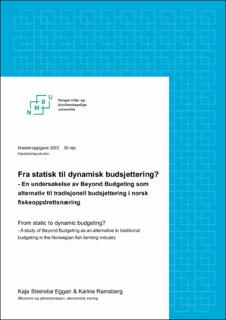| dc.contributor.advisor | Stig Aleksander Aune | |
| dc.contributor.author | Ramsberg, Karine | |
| dc.contributor.author | Eggan, Kaja Steinsbø | |
| dc.date.accessioned | 2023-07-06T16:28:25Z | |
| dc.date.available | 2023-07-06T16:28:25Z | |
| dc.date.issued | 2023 | |
| dc.identifier | no.nmbu:wiseflow:6839595:54592480 | |
| dc.identifier.uri | https://hdl.handle.net/11250/3076781 | |
| dc.description.abstract | Tradisjonell budsjettering har lenge vært betraktet som et viktig styringsverktøy, men har i moderne tid blitt kritisert for å være utilstrekkelig og lite fleksibel. Som en respons på denne kritikken har det blitt utviklet og introdusert nye styringspraksiser, deriblant Beyond Budgeting. Imidlertid er tradisjonell budsjettering fortsatt det mest vanlige styringsverktøyet i de fleste næringer, inkludert norsk fiskeoppdrettsnæring. Følgende problemstilling er derfor definert:
Hvordan kan Beyond Budgeting-filosofien egne seg for norsk fiskeoppdrettsnæring?
I denne masteroppgaven ble prinsippene i Beyond Budgeting-filosofien undersøkt som en alternativ tilnærming i norsk fiskeoppdrettsnæring. Vi har kartlagt dagens styringspraksis og sammenlignet den med prinsippene i Beyond Budgeting, samt utforsket om det er behov for og vilje til endring.
For å besvare denne problemstillingen benyttet vi oss av både kvantitative data gjennom spørreundersøkelse og kvalitative data gjennom dybdeintervjuer. Totalt 19 personer svarte på spørreundersøkelsen, og 4 økonomisjefer i 4 ulike selskaper ble intervjuet.
Studien viser at alle deltakerne benytter seg av tradisjonell budsjettering, hvor noen også inkluderer rullerende prognose og benchmarking i sine metoder. Funnene våre viser imidlertid flere måter for hvordan Beyond Budgeting-filosofien kan egne seg i denne næringen. Bransjen kjennetegnes som innovativ, med høy grad av tillit innad i organisasjonene og autonomi for de ansatte. Samtidig opererer bransjen i usikre omgivelser, særlig knyttet til svingninger i markedet, samt biologiske, politiske og økologiske forhold som gjør at budsjettet fort kan bli utdatert. Deltakerne erkjenner med dette et behov for å utvikle dagens styringspraksis. Likevel synes frykt for å miste kontroll og manglende kunnskap om alternative styringsverktøy å hindre næringen fra å ta steget fullt ut. | |
| dc.description.abstract | Traditional budgeting has long been considered an important management tool, but in modern times it has been criticized for being insufficient and inflexible. In response to this criticism, new management practices have been developed and introduced, including Beyond Budgeting. However, traditional budgeting is still the most common management tool in most industries, including the Norwegian fish farming industry. Therefore, the following research question was defined:
How can the Beyond Budgeting philosophy be applied in the Norwegian fish farming industry?
In this master's thesis, the principles of the Beyond Budgeting philosophy were examined as an alternative approach in the Norwegian fish farming industry. We examined current management practices and compared these with the principles of Beyond Budgeting, as well as exploring the need for and willingness to change.
To answer the research question, we used both quantitative data through a survey and qualitative data through in-depth interviews. A total of 19 people responded to the survey and 4 financial managers in 4 different companies were interviewed.
The study shows that the Norwegian fish farming industry uses traditional budgeting, where some also include rolling forecasts and benchmarking as supplementary tools. However, our findings show several ways in which the Beyond Budgeting philosophy can be applicable in this industry. The industry is characterized as innovative, with a high degree of trust within organizations and autonomy for employees. At the same time, the industry operates in very uncertain conditions, particularly related to market fluctuations and biological, political, and ecological factors, which means that the budget quickly becomes outdated. The participants acknowledge the need to develop current management practices. However, fear of losing control and lack of knowledge about alternative management tools seem to prevent the industry from fully embracing a new, more dynamic approach. | |
| dc.language | nob | |
| dc.publisher | Norwegian University of Life Sciences | |
| dc.title | Fra statisk til dynamisk budsjettering? - En undersøkelse av Beyond Budgeting som alternativ til tradisjonell budsjettering i norsk fiskeoppdrettsnæring | |
| dc.type | Master thesis | |
